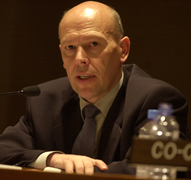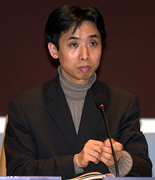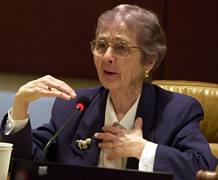|
|
|||||||||||||||||||||||||||||||||||||||||||||
|
|||||||||||||||||||||||||||||||||||||||||||||
|
Events convened on Thursday, 4 April 2002 |
|
|
Elements for a
political declaration
Nombasa Tsengwa, South Africa, stated that
South Africa views the declaration as a political deal that should include
concrete deliverables and partnerships. She stressed that the
declaration's preamble should be inspirational and provide hope, while the
operational portion should be crisp and concise, address challenges faced
in the past decade, specify priorities for international action, and
provide clear instruction on what needs to be done. She noted South
Africa's circulation of a non-paper, which addresses action around six key
areas: water, energy, agriculture and food security, health, technology,
and education, with particular emphasis on the economic dimension of
sustainable development. She emphasized that heads of State must express
their willingness to change the economic power relations of the world, and
give life to decisions taken under other fora such as the WTO and the
Financing for Development process. She also stressed the need for
mechanisms to ensure follow-up from Johannesburg and accountability and
coordination of governance issues.
Discussion: Participants highlighted several
priorities for the declaration, including: commitments to oppose the
patenting of living organisms and support communities' rights to
agricultural genetic resources; emphasis on corporate and UN governance
rather than on local governance; commitment to peace and demilitarization;
combating desertification; population; respect for the human right to a
clean environment; and the articulation of endpoints of sustainable
development.
|
|
World Civil Society Forum: Consultation and briefing Presented by the World Civil Society Forum and Mandat International Rob Wheeler, North American Representative on the WCSF Steering Committee, outlined the history of the WCSF. He recalled that the initiative for a WCSF emerged from the Millennium Forum in May 2000, with the idea that increased cooperation among civil society organizations (CSOs) and between CSOs, the UN and other international organizations could strengthen programmes and means of implementation. A preparatory session for the WCSF was held in Geneva in July 2001, where participants agreed on the framework for the WCSF. Wheeler explained that the objectives of the WCSF are to: promote cooperation among CSOs around the world; facilitate cooperation between civil society and the UN system; create space for dialogue on the relation between different stakeholders on the international stage; and consider the constitution of a permanent WCSF. The thematic topics to be addressed at the upcoming WCSF are: environment, trade and sustainable development; civil society cooperation with the UN and other international organizations; health promotion; information society; indigenous women; human rights and humanitarian law; the right of peoples to self-determination in conflict prevention; the relation between civil society and the private sector; and peace and disarmament. Take Uemura, Asian Representative on the WCSF Steering Committee, stressed the need for a strong mechanism for sustainable development governance "from below," from citizens and NGOs, and stated that the WCSF meets this need. Participants then divided into two groups. One group identified specific agenda items to be addressed under the Forum's main thematic issue of environment, trade and sustainable development, including: linkages between mining and the environment; energy issues; social responsibility of investment; population and the environment; and WTO prioritization of environmental issues. The other group discussed how to increase participation in the WCSF, highlighting the need to: use the internet as well as radio to spread the word about the WCSF; create structures to receive and respond to input from CSOs, communities and individuals around the world; recognize that grassroots movements are more organized in some areas than others; and elaborate the definition of civil society.
|
|
Urban brownfield development opportunities for economically challenged areas Presented by the Hammond Redevelopment Commission
Senn described the redevelopment site as an industrial waste dump with extensive deposits of slag, a substance that is difficult to remove and that releases metals and other pollutants into runoff. He said the site presented social and economic as well as environmental difficulties, as it was an abandoned "moonscape" with crime problems in an economically depressed urban area. Senn stressed that similar sites exist throughout the world. Noting that the redevelopment goals for this site entailed creation of economically, environmentally and socially responsible and sustainable uses, Senn said the nonprofit Hammond Redevelopment Commission partnered with groups including local citizens, the US Environmental Protection Agency, other US federal and state agencies, Purdue University, and British Petroleum in the design, implementation and monitoring phases. Senn presented images of the project near completion, which incorporates a youth life skills training center, commercial golf course, wetlands area, and bike and walking trail. Senn presented details of the construction process, which required capping the slag deposits with an impermeable layer to prevent groundwater contamination. He highlighted the experimental use of biosolids, a byproduct of sewage treatment processes, for this cap, noting that the material is abundant and acts as a nutrient-rich base for vegetation planted over it, and said a ten-year monitoring period will ensure the continued health and environmental safety of the construction. Senn said the final project incorporates sustained benefits, including: health, education, and recreation components that enhance social equity in the area; self-financing, job creation and local economic revitalization through stimulation of development on surrounding sites; and environmental restoration and education through wildlife observation opportunities, as well as remediation of the brownfield site.
|
|
Changing the global paradigm: A critical shift from corporate to earth-based priorities Presented by the Loretto Community in cooperation with the Earth Values Caucus, Peace Caucus and Energy Caucus
Bhaskar Menon, UNdiplomatic Times, described the story of the universe as being shaped by corporations, which have the same or greater powers as individual human beings and which heavily influence political and development processes. He stressed that, in order to ensure a socially just, culturally rich and environmentally sustainable future, new mechanisms for representation of people's interests are needed. He suggested the creation of economically self-sustaining "Community Corporations," which would operate on a well-defined ethical code and aim to provide social services and address community issues, and expressed hope that this concept would be tested in real life. Discussion: Participants addressed several issues relating to this paradigm shift, including: the role of the internet in creating and enhancing communities; the need for human aspects in the paradigm shift; and the benefits and challenges of "Community Corporations."
|
|
Moving beyond Armageddon to create a sustainable world of peace and justice Presented by the War and Peace Foundation and the Global Futures Network
Rashmi Mayur, Global Futures Network, presented examples of the environmental destruction resulting from wars, training exercises and the mining of weapons materials, and highlighted the negative effects of pollution on ocean health. Selma Brackman, War and Peace Foundation, discussed the exploitation of women and children stemming from violence and conflict, underlining the dangers of prostitution and the use of child soldiers. She called on the UN to forbid the recruitment of children under the age of 18 for war activities. Discussion: Participants discussed, inter alia: the idea of abolishing the nation-State; the particular vulnerability of women and children to the effects of conflict; and a new focus in the Dominican Republic on addressing poverty and women's and children's issues.
|
|
|
|
|
The Earth Negotiations Bulletin (ENB) on the Side is a special publication
of the International Institute for Sustainable Development (IISD) in
cooperation with the United Nations Development Programme (UNDP). The Editor
of ENB on the Side is Kira Schmidt
kira@iisd.org
|
|
|
|
| © 2002, IISD. All rights reserved. |
|








